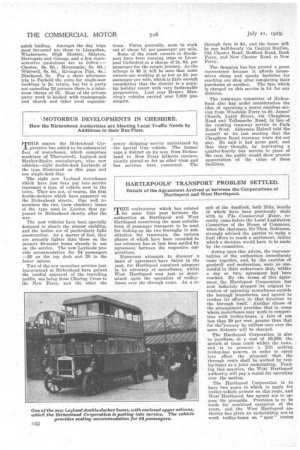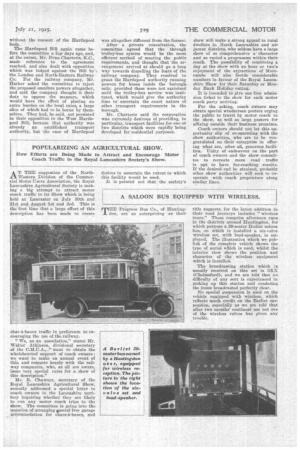HARTLEPOOLS"FRANSPORT PROBLEM SETTLED.
Page 26

Page 27

If you've noticed an error in this article please click here to report it so we can fix it.
Details of the Agreement Arrived at between the Corporations of Hartlepool and West Hartlepool.
MHE controversy which has existed for some time past between the authorities at Hartlepool and West Hartlepool concerning the most suitable form of passenger transport to be used for linking-up the two boroughs in substitution for tramways, the various phases of which have been recorded in our columns, has at last been settled by agreement between the respective corporations.
Numerous attempts to discover a basis of agreement have failed in the past, for Hartlepool remained adamant in its advocacy of motorbuses, whilst West Hartlepool was just as determined upon the operation of trolleybuses over the through route. As a re suit of the deadlock, both Bills, details Of which have been previously dealt with in The Commercial Motor, recently came before the Local Legislation Committee of the House of Commons, when the chairman, Sir Thos. Robinson, strongly advised the parties to make a final effort to reach a settlement, failing which a decision would have to be made by the committee.
Acting upon this advice, the representatives of the authorities immediately came together, and, by the exercise of goodwill and moderation, were so successful in their endeavours that, within a day, or two, agreement had been reached. By the terms of this agreement, the Hartlepool Corporation has now definitely dropped its original intention of operating motorbuses outside the borough boundaries, and agreed to confine its efforts in that direction to the borough itself. Another clause of the arrangement provides that in cases where motorbuses may work in competition with trolley-buses, a fare of not less than 50 per cent, greater than that for thejourney by railless cars over the same distance will be charged.
The Hartlepool Corporation is also to purchase, at a cost of 16,500, the stretch of tram track within the town. and is to promote a Bill seeking trolley-bus powers, in order to carry into effect the proposal that the through route shall be worked by trolley-buses as a joint undertaking. Pending this sanction, the West Hartlepool authority will pay a rental for operating over the section.
The Hartlepool Corporation is to have two years in which to apply for trolley-vehicle powers on this route, and West Hartlepool has agreed not to oppose the preamble. Provision is to be made for combined operation of the route, and the West Hartlepool authority has given an undertaking not to work trolley-buses on " spur " routes
without the consent of the Hartlepool body.
The Hartlepool Bill again came before the committee a few days ago, and, at the outset, Mr. Evan Charteris, K.C., made reference to the agreement reached, and also dealt with opposition which was lodged against the Bill by the London and North-Eastern Railway Co. For the railway company, Mr. Harker asked the committee to reject the proposed omnibus powers altogether, and said the company thought it their duty to oppose the measure, which would have the effect of placing an extra burden on the local rates, a large slice of which had to be borne by themselves. They had, he said, not persisted in their opposition to the West Hartlepool Rill, because that authority was already an established transport authority, but the ease of Hartlepool
was altogether different from the.former.
After a private consultation, the committee agreed that the through trolley-bus system would be the most efficient method of meeting the public requirements, and thought that the arrangement arrived at should go a long way towards dispelling the fears of the railway company. They resolved to grant the Hartlepool authority running powers for buses inside the borough. only, provided these were not exercised until the trolley-bus service was instituted, which would give the authority time to ascertain the exact nature of other transport requirements in the borough.
Mr. Charteris said the corporation was extremely desirous of providing, in particular, transport facilities for one or two districts which were rapidly being developed for residential purposes.
































